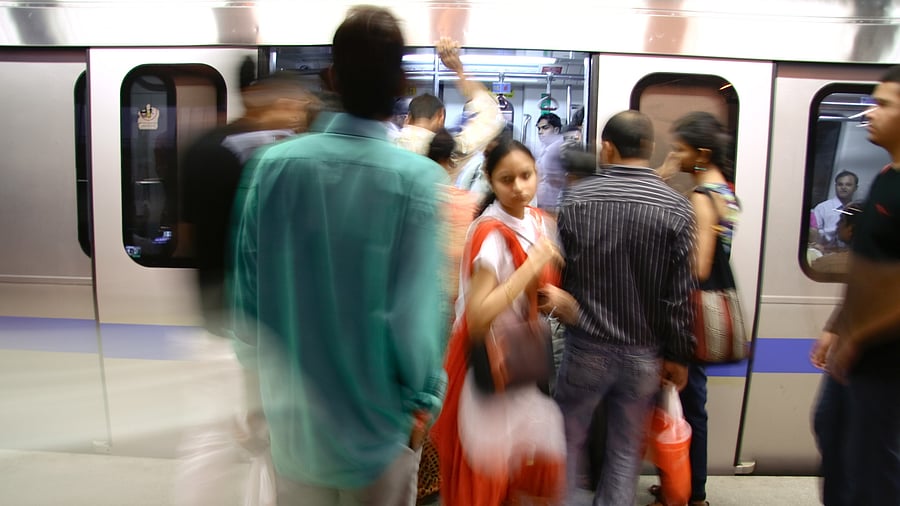
Image for representational purposes.
Credit: iStock Photo
Most middle-class people in any state capital or the national capital have experienced the panic of being recklessly overtaken and waved to the side by a jeep full of soldiers with machine guns. If you’ve experienced it, it must have been disorienting, with you even wondering if you’re inadvertently harbouring a threat to national security in your car — only to realise your real crime is a close second: you are preventing a VIP from reaching their destination a few seconds sooner.
Last month, a man travelling in a train was badly beaten up because an MLA wanted his seat. All of us have felt, at airports, on roads closed for motorcades, or while queuing for darshan at a temple, that there is a privileged tribe of netas and babus to which we do not belong. If the inconvenience ended there, we could channel our inner Mahatma and move on.
But a ruling class removed from the daily grind of the average Indian loses the ability — and sometimes the will — to understand it. If you never stand in line, never sit in traffic, never get treated poorly at a government hospital, and never have your children be illiterate after spending years in a government school, those problems feel academic, not urgent. As serious as these issues are, there is a deeper, more structural cost that often goes unnoticed. VIP culture keeps us all poorer by making life much harder for businesspeople than it needs to be.
The empathy gap between the ruler and the ruled is largest when it comes to business regulation. A Nehruvian suspicion of private enterprise still lingers in our system. For the same reason, businesspersons have long been unsympathetic figures in popular culture, even as they take risks, generate employment, and wealth for us all. This is changing, as commercial activity has come to be viewed more positively over the last 30 years, and entrepreneurs are increasingly celebrated — but we still have a long way to go. Perhaps most critically, very few ministers or senior bureaucrats have ever — heaven forbid — run a business themselves, and as a result have no visceral understanding of the challenges involved.
Unsurprisingly, after years of ‘single-window’ promises, the World Bank’s enterprise survey tells us that 13% of senior management time at Indian firms is spent navigating regulatory requirements — nearly double the South Asian average of 7%. Vietnam and China are much further ahead at 4.5% and 0.8% respectively. In these more competitive economies, this additional time is spent on strategy, innovation, or expanding operations. In ours, the real cost of inefficiency is borne silently — by firms trying to grow, and by a country falling behind.
In some ways, the cost is visible. We largely missed the first big ‘China+1’ opportunity because most global manufacturers balked at our thicket of permits, and we were unable to convince them that we would be supportive.
By contrast, in Vietnam, the entire Cabinet flew to Seoul to convince Samsung to invest. Samsung was given direct access to the senior officials of the Cabinet to ensure smooth ease of doing business. Their prime minister visited the offices of Intel, Google, and Apple, to convince them to invest in Vietnam. The result speaks for itself: Vietnam, which was poorer than India in 2007, is today almost double our per capita GDP.
In India too, accommodating business has succeeded in recent times with Apple. The resulting ecosystem — more than 1.5 lakh direct jobs driven by tens of billions in iPhone exports — shows what is possible. But there is only one Apple. They can lay claim to VIP status as much as our VIPs.
Most other firms lack Apple’s scale, leverage, and patience. Small and mid-sized enterprises find it hardest to deal with this VIP culture. In most economies, these firms form the backbone of production and exports. If we want hundreds of small, mid-sized, and large companies to invest and hire in India, a few exceptions will not cut it; the VIP culture must go!
At the national level, the prime minister recognises this. “The concept behind New India is that EPI should replace VIP. EPI means Every Person Important”, he said while banning beacons on government vehicles, in 2017. Some chief ministers and bureaucrats are also recognising and acting on this need. A few days ago, no less than the Cabinet Secretary directed all officials to meet more people and listen to their problems, in a very welcome and timely expression of this intent. But we must go a lot further.
The government can introduce greater lateral entry into the bureaucratic services. Taking a leaf out of the wise kings of India, occasionally ministers and bureaucrats can experience life as ordinary citizens or businesspeople. They can commission regular immersion exercises for senior officials — mandating stints in struggling MSMEs, logistics chains, or export zones.
Ultimately, the change must come from all of us, because unearned respect — for age, position, and power — is deeply rooted in our civilisation. Some aspects of this deference are positive, and make India a uniquely wonderful culture, but others prevent us from living our lives with more growth and dignity. The trick lies in remaining civil without being servile. That shift — in mindset as much as in policy — is what will determine whether India rewards merit instead of status, and in turn, whether we grow or stagnate.
Disclaimer: The views expressed above are the author's own. They do not necessarily reflect the views of DH.
(Rahul Ahluwalia is founder and director, Foundation for Economic Development.)